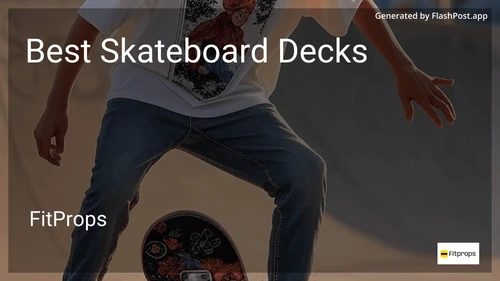Best Skateboard Decks to Buy in January 2026
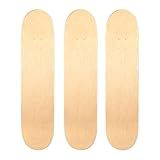
3 PCS Blank Maple Skateboard Decks, 31 x 8 inch 7-Layer Maple Double Tail Skateboard Decks Set of 3
- EXCEPTIONAL STRENGTH AND ELASTICITY FROM COLD-GROWN RUSSIA MAPLE.
- LIGHTWEIGHT MAPLE DECKS: DURABLE, LESS PRONE TO BREAKAGE.
- PERFECT MEDIUM CONCAVE SHAPE FOR BOTH BEGINNERS AND ART LOVERS.


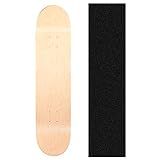
LOSENKA Maple Skateboard Decks Double Tail Skateboard Light Decks Free Skateboard Grip Tape 1 PCS
- HIGH-DENSITY RUSSIAN MAPLE OFFERS SUPERIOR ELASTICITY FOR SKATERS.
- LIGHTWEIGHT, DURABLE DESIGN ENSURES BOARDS RESIST BREAKING DURING TRICKS.
- FREE GRIP TAPE INCLUDED WITH PURCHASE; PERFECT FOR BEGINNERS AND ART!


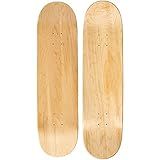
Moose Blank Skateboard Deck - Premium 7-Ply Maple Construction, Natural Wood, 7.75"
-
DURABLE 7-PLY MAPLE CONSTRUCTION FOR UNMATCHED STRENGTH AND POP.
-
MODERN SHAPE WITH MELLOW CONCAVE FOR OPTIMAL FLEX AND PERFORMANCE.
-
AFFORDABLE BLANK DECKS IDEAL FOR CUSTOM DESIGNS OR PERSONAL STYLES.


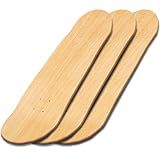
ROKENPOY 3 PCS Blank Skateboard Decks, 8 x 31 inch 7-Layer Maple Double-Tail Skateboard, Ideal for Painting, and Wall Decoration
-
PREMIUM 7-PLY MAPLE: DURABLE DECK SUPPORTS UP TO 150LBS FOR ALL SKATERS.
-
CUSTOMIZABLE DESIGN: UNLEASH CREATIVITY WITH A DIY-FRIENDLY BLANK DECK!
-
VERSATILE FOR ALL STYLES: SUITABLE FOR BEGINNERS TO PROS IN ANY SETTING.


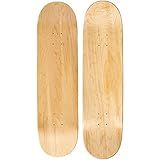
Moose Blank Skateboard Deck - Premium 7-Ply Maple Construction, Natural Wood, 8.5"
- DURABLE 7-PLY MAPLE CONSTRUCTION FOR LONG-LASTING PERFORMANCE
- MODERN SHAPE WITH PERFECT FLEX AND STEEP KICKS FOR TRICKS
- AFFORDABLE BLANK CANVAS FOR CUSTOM GRAPHICS AND PERSONALIZATION


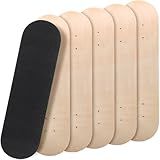
Meooeck 6 Pcs Blank Skateboard Decks for Art Painting 28 x 8 Inches, Wood Skateboard Replacement 7 Layer Maple Double Tail Plain Skate Board with Sandpaper for Home Decor
- STARTER PACK: GET 6 BLANK SKATEBOARDS, PERFECT FOR BEGINNERS!
- DURABLE MAPLE: STRONG, LIGHTWEIGHT 7-LAYER MAPLE WOOD WITHSTANDS IMPACT.
- CREATIVE FREEDOM: DIY DESIGNS ON FROSTED DECKS FOR PERSONALIZED STYLE!


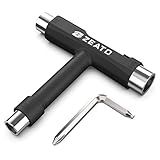
Zeato All-in-One Skate Tools Multi-Function Portable Skateboard T Tool Accessory with T-Type Allen Key and L-Type Phillips Head Wrench Screwdriver - Black
- ALL-IN-ONE DESIGN: REPAIR ANY SKATEBOARD TYPE EFFORTLESSLY!
- ANTI-LOSS STRUCTURE: NEVER LOSE YOUR TOOLS WITH SECURE STORAGE!
- PORTABLE & LIGHTWEIGHT: COMPACT DESIGN FOR ON-THE-GO CONVENIENCE!



Powell Peralta Andy Anderson Hydrant Flight Skateboard Deck, Gold Foil, 8.4" x 32"
- LIGHTWEIGHT, DURABLE FLIGHT CONSTRUCTION FOR ENHANCED PERFORMANCE.
- NEW SHAPE AND CONCAVE DESIGN FOR SUPERIOR CONTROL AND COMFORT.
- MADE IN THE USA WITH PREMIUM MATERIALS FOR LASTING QUALITY.


When it comes to skateboarding, the deck is arguably the most crucial component. It's the canvas of your tricks, the platform of your balance, and the foundation of your ride. Choosing the best skateboard deck can be the difference between a smooth, controlled ride and a wobbly, unstable one. In this guide, we explore everything you need to know about skateboard decks and how to choose the right one for you.
Understanding Skateboard Decks
A skateboard deck is the flat board on which a rider stands. It is typically made of multiple layers of wood, most commonly maple, but can also be constructed using bamboo, carbon fiber, or fiberglass to enhance flexibility and durability. The deck includes several key features, such as its width, length, shape, and concave, each influencing how you ride and perform tricks.
Why Deck Size Matters
Width
The width of a skateboard deck is perhaps the most crucial factor to consider. Deck width usually ranges from 7.5 to 8.75 inches. A wider deck provides more stability and is generally preferable for ramps and vert skating. Conversely, a narrower deck is lighter and easier to flip, making it suitable for street skating and technical tricks.
Length
The length of the deck, although less critical than the width, can still affect your skateboarding experience. Most skateboard decks range from 28 to 33 inches long. Shorter boards are more maneuverable and responsive, while longer boards offer more space and stability, particularly useful for taller riders or those learning to skateboard.
The Importance of Deck Shape
Skateboard decks come in various shapes, each designed for specific styles of riding:
- Popsicle Shape: The most common shape for street and park skating, with a symmetrical design that makes it easy to perform tricks.
- Cruiser Shape: Typically features a kicktail, suitable for cruising and getting around town but not ideal for tricks.
- Old School Shape: Often wider with a flat nose, suitable for pool skating and old-school street skating.
Understanding Deck Concave
The concave of a skateboard deck refers to the curvature across its width, affecting control and comfort. Types of concave include:
- Low Concave: Provides a stable platform, excellent for cruising and beginners.
- Medium Concave: Balances control and comfort, suitable for most riders and styles.
- High Concave: Offers more edge control for technical tricks, preferred by experienced riders.
Material and Construction
The material and construction of a skateboard deck significantly impact its durability and performance. Traditional decks are made of 7-ply maple wood, offering a balance of strength and flexibility. Alternative materials like bamboo and fiberglass can provide added benefits such as lighter weight or increased flexibility, often at a higher price point.
Choosing Based on Skill Level
Your skill level is a crucial factor when selecting the best skateboard deck:
- Beginners: Should prioritize stability and comfort, often achieved with wider decks and a medium concave.
- Intermediate: Riders typically know their preference for tricks or cruising and can select accordingly.
- Advanced: These skaters often have specific requirements and may opt for decks that suit their specialized needs or styles.
Conclusion
Selecting the best skateboard deck involves a fine balance between your personal preference, skating style, and skill level. Understanding the variables such as width, length, shape, and material can ensure you choose a deck that enhances your skating experience. Whether you're just starting or looking to refine your setup, taking the time to assess your needs will lead to an optimal choice that supports your passion for skateboarding. Remember, the best deck is one that feels right under your feet, so don't hesitate to test different options before making your final decision.
